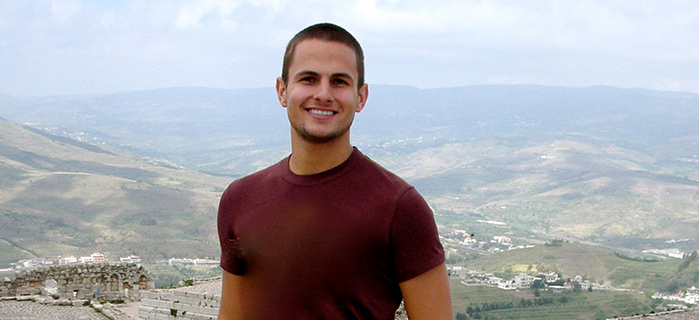Jesse Lynch and Lisa Roman were two of the last fellows who studied in Syria through Arabic Overseas Language Flagship program. Eleven years later, the two have continued using their language skills to build successful, global careers.
Looking back, Mr. Lynch says he was always interested in languages but started to focus his attention on Arabic and the Middle East after 9/11, when he was a sophomore at Florida State University.
“I knew I wanted to do something that would allow me to see and experience other cultures and to build a bridge between America and the world,” he said.
His French teacher, who was Lebanese, agreed. She started an Arabic program at the university and invited Mr. Lynch to join.
“She saw [starting the program after 9/11] as an opportunity to turn some of the hatred…into something more productive and positive,” Mr. Lynch said.
For Ms. Roman, studying language began with a more academic focus.
“It was more of a personal improvement reason than an intention to turn it into a career,” she said.
The Language Flagship is a competitive scholarship that offers advanced-level study to American students in seven languages, through domestic instruction and a capstone year overseas.
Mr. Lynch and Ms. Roman were both graduate students when they started Flagship, studying at the University of Maryland and Georgetown University, respectively. They were in the same cohort for the overseas portion of the program, which American Councils for International Education administers.
Mr. Lynch had traveled extensively in the Middle East through various opportunities in undergraduate and graduate school, including living in Jordan and Egypt. He briefly considered heading straight into the workforce, but instead decided to study in Syria.
“I knew that if I really wanted to use the language and I wanted to use it professionally, I needed that extra engagement with the language that Flagship would offer me,” he said.
Civil unrest in Syria prompted the relocation of the Arabic Overseas program to Morocco, several years after Mr. Lynch and Ms. Roman completed their studies. They now recognize that their experience was a special privilege.
“It afforded us insight to a country and culture that not many Americans have had the pleasure of experiencing,” Ms. Roman said.
Students lived with host families for six months of the program, and focused on learning local dialects. Most formal classes focus on Modern Standard Arabic, Ms. Roman explained, but dialect is essential for every day conversations.
“You can move from a transactional language to language where relationships are built,” she said.
It was building relationships with host families and locals that helped fellows understand the culture “from the inside out,” Mr. Lynch explained.
“I would say that my time in the region prior to Flagship was only at the surface level,” he said.
He was quick to add that it wasn’t always easy.
“One of the things that looking back I appreciate, is the program really pushed us to our limit and pushed us beyond our limits,” he said. “There were times when it was very difficult and the amount of work they gave us was very challenging.”
The resulting language mastery was worth the tough times.
Mr. Lynch interned with the United Nations Development Programme in the final months of Flagship, traveling around Syria talking to locals about microfinance loans.
“It was very impactful to be able to speak with people about how these small, little investments made such big changes in their lives,” he said. “What was even more special was to be able to have these conversations in Arabic.”
Most of the fellows from their Flagship cohort have worked in Syria at some point in the ensuing years, Ms. Roman said. During her career, she helped implement the first cease-fire in the Syrian conflict, including daily talks with troops on the ground.
“There’s no way you will get the same level of immersion without spending time in a country where the language you’re learning is the primary language spoken,” she said. “There is no substitute for that.”
She encouraged others considering the Flagship program to keep an open mind.
“Although I remained on the government track, it feels like there is a whole world of opportunities out there to use your language,” she said.
“I consider myself now a real public servant,” she added, noting that though she recently took a private sector role, she hopes to return to government work in the future.
Mr. Lynch has also continued using his language around the region in various capacities, most recently with the Foreign Service. At his current post in Cambodia, he said he has applied the skills he gained in Flagship to take on a new language and connect with locals. In every role, he has been able to continue working toward his original goal of building bridges between Americans and the world.
“We have the same cares. We have the same desires in our families and societies,” Mr. Lynch said. “We may be different, but as people, we have more in common than we don’t.”
About The Language Flagship
The Language Flagship is a national initiative to change how Americans learn languages.
Through a network of 25 Flagship Programs at 21 institutions of higher education across the United States, graduates of the program represent the next generation of global professionals, commanding a superior level of proficiency in one of ten languages critical to US national security and economic competitiveness.
Students come from all regions of the US to pursue a variety of academic and professional interests, in addition to language study. The Language Flagship is funded by the National Security Education Program (NSEP); additional funding is available through the Boren Awards. Learn more.

